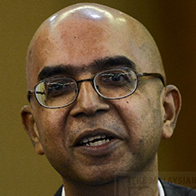In my last article I considered the question "does Malaysia practise democracy?" I said that on a scale of 1-4, I would rate Malaysia "1". Several readers objected.
 To put it politely, the objectors said I was too generous. They said I should have said "we don't practice democracy".
To put it politely, the objectors said I was too generous. They said I should have said "we don't practice democracy".
They overlook the fact that the regime is still anxious over the losses it suffered in the general elections in 2008 and 2013. It is so anxious that it will not enter the next election without creating new, more-gerrymandered and more-malapportioned constituencies, wooing representatives from the Bornean states, and demonising the opposition.
So, the regime fears it will suffer at the next "democratic" elections - it has even passed into law the National Security Council (NSC) Act, which many suspect will be used to stifle democracy if the regime fails to win a majority.
(It is worth noting that the NSC Act may be challenged in court on the basis of its contravening the Constitution.)
I was surprised that no one called me out for not touching on the core elements of our democracy, namely the executive, parliament and judiciary.
In previous articles, I have argued that both the Dewan Rakyat and the Dewan Negara are mere rubber stamps for the decisions of the executive. So, in this post I will focus on the judiciary.
The judiciary is another institution which is not discussed in schools. Therefore, the public has little knowledge of the function and development of the judiciary.
The reputation of the Malaysian judiciary continues to be in tatters due to the regime's inaction over many allegations concerning judges.
No one has paid a price for the V.K. Lingam affair - which concerned wrongful influence in the appointment of judges - despite a Royal Commission of Inquiry report in 2008.
There are many more blemishes, not least of which is the Court of Appeal's 2009 decision to disallow the Perak Assembly speaker from suspending seven assemblymen.
Retired judge, Datuk N.H. Chan termed the panel on that bench (Alauddin Mohd Sheriff PCA, Arifin Zakaria CJM, Nik Hashim Nik Ab Rahman, Augustine Paul and Zulkefli Ahmad Makinudddin FCJJ) "the infamous five".
Justice Chan named them so because they blatantly disregarded Article 72(1) of the Federal Constitution which reads "The validity of any proceedings in the Legislative Assembly of any state shall not be questioned in any court."
I would remind readers' of the Allah decision, which I touched on in my last article, and of the Sarawak constituency delineation case in which the judges adopted a regime-serving, narrow interpretation of the Constitution - contrary to the spirit of the Constitution.
As lawyer Lim Wei Jit pointed out in The Malaysian Insider, "the disclosure of details (pertaining to the constituency delineation) is a prerequisite, not a wildly imaginative leap, to the very "effect" which the Court of Appeal is emphasising."
And, let's not forget Justice Datuk Mohd Hishamudin Yunus not being promoted allegedly because of his "politically incorrect" though legally justified interpretations.
Judges are an integral part of a constitutional democracy. They are interpreters of the Constitution which is the supreme law of the land. They are invested with the power of judicial review.
Judicial review allows judges to consider and possibly invalidate laws and even actions of other branches of government if they are incompatible with the constitution.
In India, in 1973, a 13-member bench of India's apex court established a principle called the "basic structure doctrine". This doctrine held that Parliament cannot change fundamental features of the constitution - for instance those related to freedom. (Kesavananda Bharati v. State of Kerala case)
That case best illustrates how Indian judiciary rose to "fill the moral gap" when, in the 1970s, the ranks of elected representatives began to include many against whom there were criminal cases. Nothing has changed in India, the world's largest democracy.
After Narendra Modi's triumph in May 2014, a national newspaper (The Hindu) noted "The 16th Lok Sabha will have the highest number of MPs with criminal cases against them. According to... affidavits filed before the Election Commission, 34 per cent of the new MPs face criminal charges. The percentage in 2009 and 2004 stood at 30 and 24 respectively."
Attorney-General Tan Sri Mohamed Apandi Ali had decided not to prosecute the prime minister despite the alleged recommendations by the Malaysian Anti-Corruption Commission in the SRC International case. Datuk Zaid Ibrahim has applied for judicial review.
Will the Malaysian judiciary rise to fill the moral gap through judicial review of the A-G's decision? Will the judiciary have opportunity to decide on the NSC Act?
If the judiciary doesn't rise up to the moral challenge, our democracy deficit will grow. – February 4, 2016.
* This is the personal opinion of the writer, organisation or publication and does not necessarily represent the views of The Malaysian Insider.


Comments
Please refrain from nicknames or comments of a racist, sexist, personal, vulgar or derogatory nature, or you may risk being blocked from commenting in our website. We encourage commenters to use their real names as their username. As comments are moderated, they may not appear immediately or even on the same day you posted them. We also reserve the right to delete off-topic comments